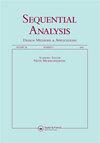随机视野下的序列假设检验
IF 0.6
4区 数学
Q4 STATISTICS & PROBABILITY
Sequential Analysis-Design Methods and Applications
Pub Date : 2020-04-02
DOI:10.1080/07474946.2020.1766875
引用次数: 2
摘要
摘要我们考虑了一个问题,基于在随机视界H存在的情况下对离散时间随机过程的观察,将一个简单假设与一个简单的替代方案进行顺序检验。在实验的任何时间n,统计学家只被告知是否H > n。在后一种情况下,应终止实验,并根据现有观察结果做出接受或拒绝假设的最终决定()。假设H与观测值无关,统计学家已知其分布。在随机水平下,我们考虑修正的Kiefer-Weiss问题的一个变体:在对误差概率的限制下,最小化在假设观测遵循固定分布的情况下计算的平均样本量,而不一定是假设的分布之一。在过程和/或范围上的适当条件下,我们刻画了该问题中所有最优序列测试的结构。然后,我们将这些结果应用于独立观测情况下的最优检验。在一般理论的基础上,对具有几何分布视界的独立同分布(i.i.d.)观测得到了更具体的结果。在一个简单的采样模型中,我们解决了随机水平模型下的Kiefer-Weiss问题。我们还讨论了随机视界存在下的Wald-Wolfowitz最优性问题。特别地,我们证明了最优检验的停止规则,在其中一个假设下最小化平均样本量,是Wald序列概率比检验的随机版本。本文章由计算机程序翻译,如有差异,请以英文原文为准。
Sequential hypothesis tests under random horizon
Abstract We consider a problem of sequential testing a simple hypothesis against a simple alternative, based on observations of a discrete-time stochastic process in the presence of a random horizon H. At any time n of the experiment, the statistician is only informed whether H > n or not. In this latter case, the experiment should be terminated and the final decision on the acceptance or rejection of the hypothesis should be taken on the basis of the available observations ( ). H is assumed to be independent of the observations, and its distribution is known to the statistician. Under the random horizon, we consider a variant of the modified Kiefer-Weiss problem: given restrictions on the probabilities of errors, minimize the average sample size calculated under the assumption that the observations follow a fixed distribution, not necessarily one of those hypothesized. Under suitable conditions on the process and/or the horizon, we characterize the structure of all optimal sequential tests in this problem. Then, we apply these results to characterize optimal tests in the case of independent observations. On the basis of the general theory, more specific results are obtained for independent and identically distributed (i.i.d.) observations with a geometrically distributed horizon. In a simple sampling model, we solve the Kiefer-Weiss problem under the random horizon model. We also discuss the questions of Wald-Wolfowitz optimality in the presence of the random horizon. In particular, we show that the stopping rules of the optimal tests, minimizing the average sample size under one of the hypotheses, are randomized versions of those of Wald’s sequential probability ratio tests.
求助全文
通过发布文献求助,成功后即可免费获取论文全文。
去求助
来源期刊

Sequential Analysis-Design Methods and Applications
STATISTICS & PROBABILITY-
CiteScore
1.40
自引率
12.50%
发文量
20
期刊介绍:
The purpose of Sequential Analysis is to contribute to theoretical and applied aspects of sequential methodologies in all areas of statistical science. Published papers highlight the development of new and important sequential approaches.
Interdisciplinary articles that emphasize the methodology of practical value to applied researchers and statistical consultants are highly encouraged. Papers that cover contemporary areas of applications including animal abundance, bioequivalence, communication science, computer simulations, data mining, directional data, disease mapping, environmental sampling, genome, imaging, microarrays, networking, parallel processing, pest management, sonar detection, spatial statistics, tracking, and engineering are deemed especially important. Of particular value are expository review articles that critically synthesize broad-based statistical issues. Papers on case-studies are also considered. All papers are refereed.
 求助内容:
求助内容: 应助结果提醒方式:
应助结果提醒方式:


